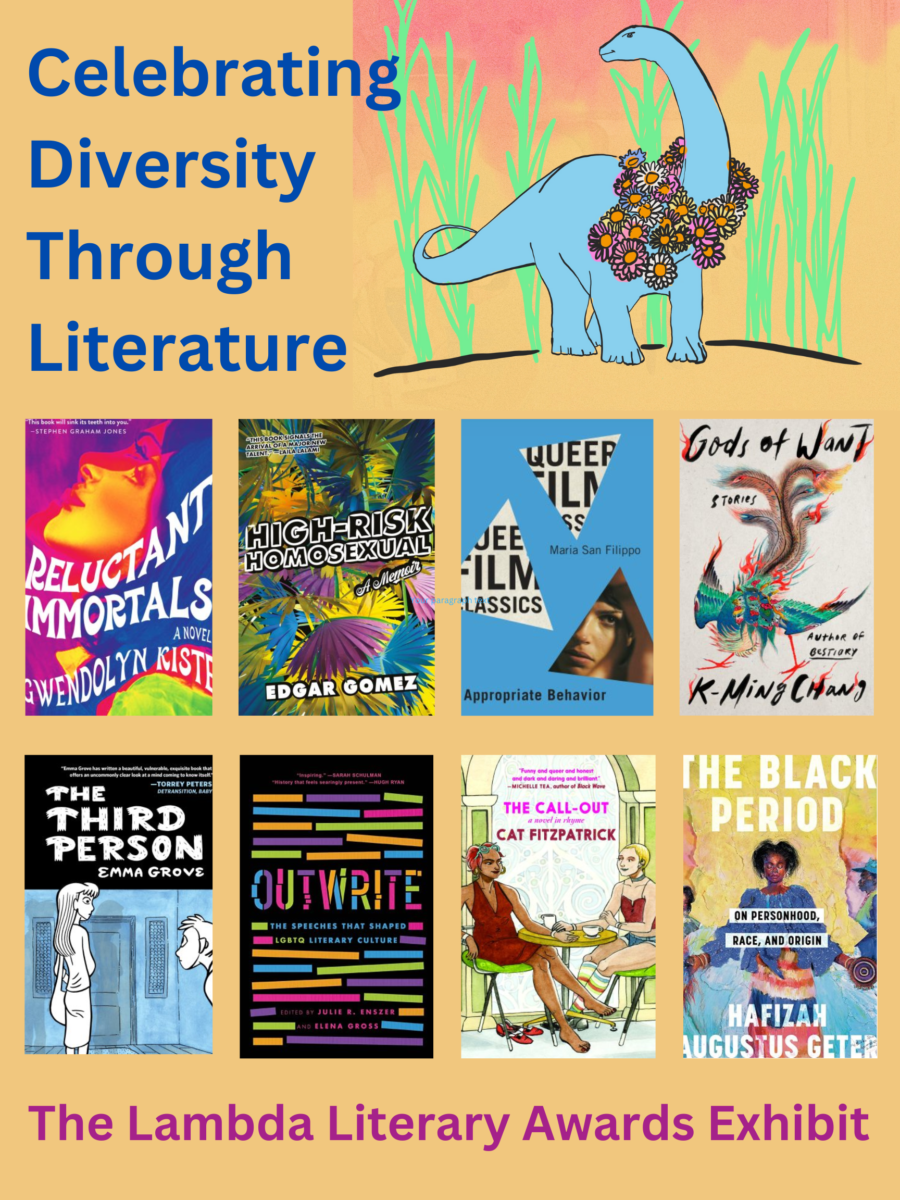This October, Emory’s Woodruff Library has curated a small book display dedicated to celebrating the Lambda Literary Awards. This captivating collection showcases an array of outstanding LGBTQ+ literature recognized for its exceptional contribution to the literary landscape.
 Our exhibit features everything from diverse and creative novels that challenge social norms, poetry that explores the intricacies and intimacies of identity, nonfiction works about gender expression, racialization and politics, graphic novels about coming out and surviving as a queer person, and even speculative narratives about imagined futures and alternative presents and historical pasts fantasized otherwise.
Our exhibit features everything from diverse and creative novels that challenge social norms, poetry that explores the intricacies and intimacies of identity, nonfiction works about gender expression, racialization and politics, graphic novels about coming out and surviving as a queer person, and even speculative narratives about imagined futures and alternative presents and historical pasts fantasized otherwise.
This display is ultimately a celebration of the power of words to inspire, educate, and transform — especially words from those who have not been adequately represented, historically or in the literary canon, and from those whose identities have gained political articulation as a non-normative orientation or expression. Join us on a journey through the history and significance of the Lambda Literary Awards and discover how these remarkable books enrich our library’s collection. Emory Libraries deliberately collects LGBTQ+ resources and materials, but if users note that any titles are missing or have suggestions for our collection, they can use our purchase request form.
Introducing the Lambda Literary Awards
The Lambda Literary Awards, also known as the “Lammys,” stand as a beacon of recognition for LGBTQ+ writers and their contributions to literature. Since their inception in 1989, these awards have celebrated the exceptional voices that have often been marginalized in mainstream literary circles.
Covering a wide range of genres including fiction, nonfiction, poetry, and more, the Lammys honor works that explore the LGBTQ+ experience, addressing issues of identity, love, discrimination, and personal growth. This exhibit serves as a testament to the power of storytelling as a tool for representation and advocacy, reminding us of the ongoing need for diverse narratives that reflect the myriad experiences within the LGBTQ+ community.
Our Lambda collection
Emory Libraries boast a diverse and extensive collection of Lambda Literary Award-winning books. These works are not just confined to a single section but are thoughtfully integrated throughout various genres and categories, reflecting the fluidity and intersectionality of LGBTQ+ experiences. This deliberate placement highlights the interconnectedness of narratives and the shared human experiences that bind us all. From the heartfelt stories of coming out to the exploration of historical moments, our catalog proudly showcases the immense contributions of LGBTQ+ authors to the literary world.
Discovering LGBTQ+ literary excellence: Navigating the catalog
Users can utilize our advanced search filters to specifically search for Lambda Literary Award winners across genres and navigate the Emory Libraries catalog to explore these exceptional works. In order to locate Lambda Award Winners and other LGBTQ+ specific texts, use the following search terms in a “keyword” or subject search:
- Gender nonconformity
- Gender expression
- Sexual identity
- Gender dysphoria
- LGBTQ+ literature
- LGBTQ+ culture
- LGBTQ+ poetry
- LGBTQ+ fiction
- And many others
Gender and sexuality terms have evolved and proliferated over the last 30 years and locating materials can prove difficult without substantial background knowledge of shifting terminology. Please check out Emory’s research guides on locating LGBTQ+ materials if you’d like more information on navigating the Emory Libraries catalog.
Explore the exhibit in person
As we traverse the pages of the Lambda Literary Awards exhibit, located on the second floor of the Woodruff Library, we are reminded that literature possesses the extraordinary ability to unite, educate, and inspire. The showcased books not only amplify the voices of LGBTQ+ individuals but also foster understanding and empathy among all readers. The library stands as a sanctuary where these narratives can be explored, appreciated, and celebrated.
By providing a platform for these stories, we honor the diversity of human experiences and recognize the power of literature to shape conversations and effect positive change. So, let us continue our collective journey towards a more inclusive and compassionate world.
You can also help us with making our catalog more inclusive. If you see something in the catalog that seems offensive, harmful, or misrepresented, please let us know via our “Report Harmful or Offensive Language in Emory Library Catalog Entries” form.
—Tyler Tennant, visiting assistant professor, Emory Writing Program
